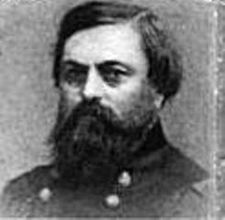 |
| Capt. Israel Vogdes, First Artillery |
| When
the U.S.S. Brooklyn reached Fort Pickens, the situation had
changed: An informal truce had been worked out between the
Federal and state authorities, the essence of which was that the
military situation could not be changed by either side unless the other
side became aggressive. Thus, Vogdes could not land his company
of reinforcements unless the gathering state forces made an overt move
to seize Fort Pickens. So, the troops were there, near the fort,
but could not go in the fort.
|
|
|
PENSACOLA HARBOR,
FLA., February 7, 1861. Col. L. THOMAS, SIR: I have the honor to report
that I arrived on this station yesterday in the U. S. steamer Brooklyn, with
Company A, First Artillery. I met orders here which prevent the landing of my
company or the re-enforcement of the garrison of Fort Pickens at present.
Yesterday I landed at Fort Pickens, assumed command of the forces on the
station, inspected the defenses, and had a consultation with Lieutenant
Slemmer. I am compelled to remain on board the Brooklyn for the present, and
can, of course, only give general instructions to Lieutenant Slemmer. I am
sorry to inform the Department that I found Fort Pickens in a very inefficient
state of defense. At the time Lieutenant Slemmer removed his command to Fort
Pickens there were only forty guns mounted in the fort. At present there are
fifty-four in position. The accompanying sketch [not found] indicates
the position and class of guns now in position; total, fifty-four of all kinds. Lieutenant Slemmer has with him
only forty-six enlisted men for duty, and thirty ordinary seamen from the yard
at this station, and the latter are entirely untrained, insubordinate, and of
but little use in case of attack. There are fifty-seven embrasures that are
unprovided with cannon, and are only about seven feet from the bottom of the
ditch, and at present but few of them have only the common wooden shutter,
presenting only a slight obstacle to an enemy. There are only very imperfect
means of barricading them. Such as they are, however, I have given orders to be
immediately employed. The seceders have a considerable
force in and about Pensacola; what number I am unable to say positively, but
they are estimated at about 1,700 men. They are disorderly, and very unwilling
to be controlled. Their leaders, from what I can learn, I believe are sincere
in their intention to observe the armistice, but their ability to control the
men under their command is very doubtful. They are engaged in erecting
batteries, are making sand bags, &c. They have plenty of means of
transporting their troops to Santa Rosa Island, and can attack the fort on all
sides at once. At present there is not one trained man to a gun within the
fort. Should the enemy decide to attack, it is exceedingly probable that he
might succeed in penetrating into the fort before my company could be landed or
any succor could arrive from the fleet. I should therefore urge upon the
Department the necessity of the fleet taking up a position such as to prevent
the landing of any forces within one and a half miles of the fort; this would
give time to provide for the defense of the work and the landing of the troops
from the fleet; otherwise we may have the mortification and disgrace of seeing
the fort taken by a body of untrained troops under our very noses. Should the armistice be broken,
my company, all the marines, and as many sailors as may raise the garrison to
four hundred men should be immediately landed. All of the advantages of the
present armistice are entirely on the side of the seceders. I would therefore
urge upon the Department the necessity of immediately re-enforcing the
garrison. The two additional companies ordered to Forts Taylor and Jefferson
are not immediately required for the defense of those works. In fact, in their
present state, and with the forces now in them, they would be stronger than
Fort Pickens will be when garrisoned with four hundred men. Captain Meigs
kindly offered his services, if necessary, to assist in the defense of this
place, and I request the Department that he may be ordered to repair to this
place. Lieutenant Slemmer has done all
that it has been possible to do with the small force under his command. His
resolution to defend his post at all hazards evinces the highest moral courage
on his part, but at the same time I must state that with any amount of vigor on
the part of the assaulters his defense would have been hopeless. His resolution
has probably been the means of preserving Fort Pickens from the seceders. Yours, &c., I. VOGDES, Captain, First
Artillery. |
Back to Civil War Chronologies (Main page) Back to Chronology of the Fort Sumter Crisis Source: OR, vol. 1, pp. 357--58 Date added to website: January 10, 2025. |